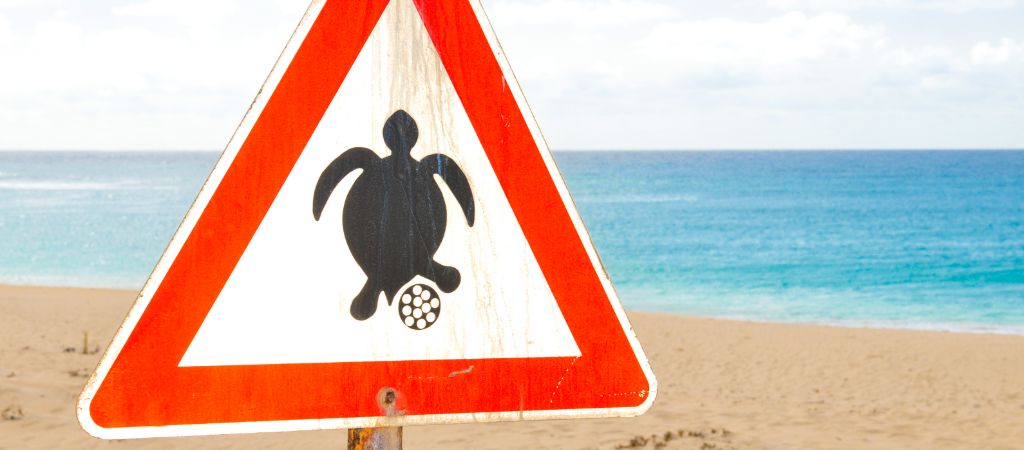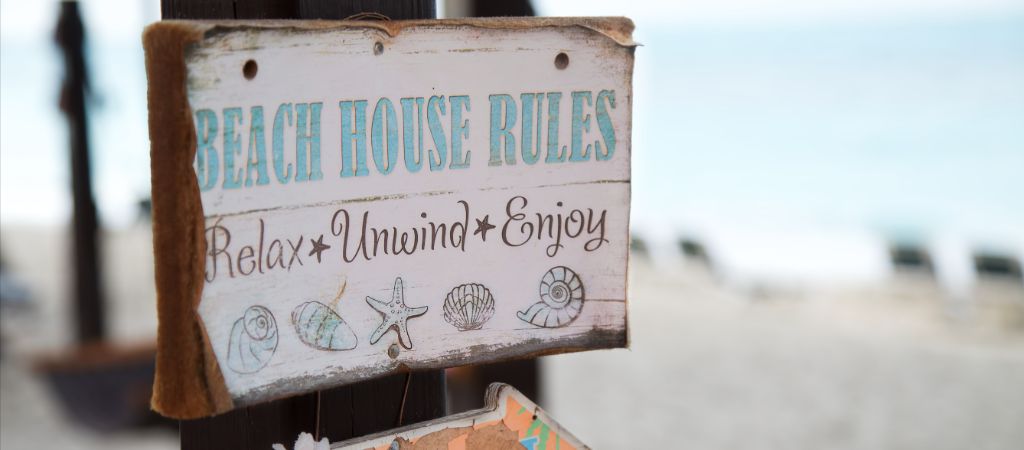There’s a reason beach house vacation rentals are becoming more popular than ever — having extra space, more privacy, must-have amenities, and access to a full home is one of the best ways to enjoy a vacation. For beach house rental owners or managers, keeping your property booked year-round requires a careful balance of hospitality and house rules.
Whether you’re new to the vacation rental industry or have been managing beach houses for years, having a go-to set of guidelines and rules is crucial if you’re going to see a long-term return on investment. Not only can you enhance your short-term guests’ experiences, but you can also protect your property from damage and ensure it stays in top condition for years to come.
But it’s more than just “take out the trash” and “always lock the door.” A full set of beach house rules for your Florida vacation home on the Gulf Coast ensures guests know exactly what’s expected of them during their stay and can help you avoid common issues that often arise in the vacation rental industry.
Why Create Beach House Rules?

We get it — when you’re on vacation, you want to let your hair down and have a bit of fun, right? But when you’re the one responsible for the longevity of your property, having a set of rules can help set up a positive relationship between the homeowner and the guest — keeping everyone on the same page from the start.
Vacation rental house rules are twofold: to protect your property and enhance the guest experience. Well-written rules prevent misunderstandings, reduce the risk of damage to your property, and create a framework for good behavior. They also show you are committed to a high-quality beach house rental, which will lead to better reviews and more bookings.
Balancing Guest Experience vs Property Protection
One of the biggest challenges in writing beach house rules is balancing protecting your investment and offering your guests a stress-free beach getaway. While you need to set boundaries, too many rules can scare off potential renters…or lead to bad reviews.
As you sit down to create your beach house rules, follow this hierarchy of importance.
- Safety always comes first!
- Protecting your property from major damage
- Maintaining good neighborly relationships
- Enhancing the guest experience
Remember: you want to create an environment where your guests can relax and have fun while respecting your property and the surrounding community.
Shielding Your Investment — Legally
Protecting yourself legally is a big part of managing a short-term rental. Once you have your beach house rules in place, you need to add them to your rental agreement. This legal document is a binding contract between you and your guests outlining the terms and conditions of their stay.
When adding your rules to the rental agreement, consider the following.
- Use simple language to avoid confusion.
- Highlight the rules that, if broken, will result in the loss of the security deposit.
- Include any Florida regulations or local ordinances your guests must follow.
- State the consequences of breaking the rules.
Adding your house rules to the rental agreement protects you legally and ensures your guests acknowledge and agree to follow your rules before they stay. At Florida CFY, we cover this and more in our full-service management program!
Writing Beach House Rules by Category

To write a full set of beach house rules, it’s helpful to categorize them. This makes it easier for your guests to understand and follow the rules during their stay. Let’s get started!
Check-in & Checkout Procedures
Simple and efficient check-in and checkout procedures are critical for a positive guest experience and successful property management. These rules help you control access to your property and make sure the property is prepared for each new guest.
- Check-in time & process (e.g. digital lock codes, arrival walk-throughs)
- Checkout time & expectations (e.g. tidying up, trash disposal)
- Late check-in or early checkout policy
- Property inspection before & after each stay
Example rule: “Check-in time is 4:00 PM. Early check-in is available upon request, subject to availability and an additional fee.”
Property & Amenities Rules
This section covers how your guests should use and look after your property and its amenities. It’s especially important for beach house rentals, which often have special features like pools, beach equipment, or outdoor spaces.
Be sure you include the following.
- Swimming pool usage & safety (e.g. no diving, adult supervision required)
- Beach access & beach towels
- Use of outdoor spaces & equipment
- Care & cleaning of indoor amenities (e.g. kitchen appliances, entertainment systems)
Example rule: “The pool is open from 8:00 AM to 10:00 PM. No diving. Children must be supervised by an adult at all times.”
Psst…our Florida CFY Advantage Plan covers swimming pool care, including installing smart locks and pool inspections for guest safety.
Guest Behavior & Conduct
Setting guest behavior expectations helps maintain a peaceful environment and good relationships with your neighbors. This is especially important in residential areas where noise or disruptive behavior can be a problem — the last thing you want is a noise complaint or a ticket from the authorities!
Here are some behavior and conduct rules to consider.
- Noise levels & quiet hours
- Occupancy limits & visitor policy
- Smoking & pet policy (if you allow pets at your vacation rental)
- Respect for neighbors & shared spaces
Example rule: “Please keep noise levels down after 10:00 PM and before 8:00 AM. Excessive noise that disturbs neighbors may result in a noise complaint and fine.”
Safety & Security Guidelines
The safety and security of your guests and property are top priorities when renting a beach house. Clear rules in this category can help prevent accidents, protect your investment, and give both homeowners and guests peace of mind.
Make sure to include the following.
- Emergency procedures & contact numbers
- Security deposit & damage reporting
- Use of safety equipment (e.g. fire extinguishers, first aid kits)
- Locking doors & windows when you leave the property
Example rule: “A $500 security deposit is required for all bookings. This will be refunded within 7 days of checkout if no damage or rule violations occur during your stay.”
Cleaning & Maintenance
Clear rules for cleaning and maintenance will help keep your property in great shape and reduce conflicts with guests over cleaning fees or damage charges. Even if you are planning to have a professional crew come through after each stay, it can help to set some expectations up front to prevent miscommunication.
Consider the following.
- Daily cleaning expectations (e.g. sand removal, dishwashing)
- End-of-stay cleaning requirements
- Trash and recycling procedures
- Reporting maintenance issues
Example rule: “Rinse off sand before entering the house. Beach towels are provided for recreational use; please do not use them to clean floors or furniture.”
Unique Florida Beach House Rules

Florida has its own climate, environment, and regulations that require special rules for beach house rentals in the state. By covering these areas, you’ll be compliant with local laws as a rental host, and your guests will be prepared for the Florida beach experience.
Hurricane Prep
Florida’s hurricane season is from June to November, and you need to have rules and procedures in place for guest safety during these times.
- Securing outdoor furniture & equipment
- Evacuation procedures & routes
- Emergency supplies at the property
- Local emergency contact numbers
Example rule: “Hurricane season (June – November) can develop high winds and strong downpours. Please put away all beach equipment, like umbrellas and boogie boards, in the outdoor storage box when not in use.”
Pro tip: homeowners who partner with Florida CFY can take advantage of hurricane monitoring and evacuation options to our sister properties in North Georgia and Tennessee. This gives your guests another place to retreat instead of canceling their vacation in extreme weather conditions.
Sea Turtle Nesting Season
Many Florida beaches are sea turtle nesting grounds from May to October. Beach house rental owners should have rules to protect these endangered creatures, especially if your property is in a beachfront location.
Example rule: “During sea turtle nesting season (May – October), please turn off all exterior lights facing the beach by 9:00 PM. Use the provided red flashlights for nighttime beach walks.”
Local Ordinances — Update Rules Accordingly
Each Florida municipality has its own set of rules for short-term rentals. Check local laws and include them in your house rules template. And make sure you stay ahead of any updates, particularly if you are managing from another state.
Example rule: “Our beautiful secluded area requires all residents and temporary guests to park in the designated parking spots. Please do not park on the roads for any reason.”
Tips to Balance Your Rules & Guest Experience

While rules are important, don’t let them overshadow the vacation experience. Getting the balance right means happy guests who will follow the rules, leave good reviews, and book again.
1. Lead with a Home-Away-From-Home Feeling
When your guests arrive, make sure they are aware of your beach rental rules and equally overwhelmed with your hospitality.
- Use friendly language in your messages.
- Provide a welcome basket with local goodies or beach goodies.
- Add a personal touch, like a handwritten welcome note.
- Ensure the property is spotless and well looked after on arrival.
2. Position Your Vacation Rental Rules in a Positive Light
How you word your rules can make a big difference to how guests perceive and follow them. Frame your rules positively so they don’t feel restrictive. Explain the reasoning behind the rules to help guests understand the purpose and focus on the benefits to the guest or community.
Negative framing: “No loud noises after 10:00 PM under any circumstances. Fees will be strongly enforced.”
Positive framing: “To ensure everyone can have a peaceful evening, please keep the noise down after 10:00 PM. This helps us maintain good relations with our neighbors and means you’ll have a quiet space for a good night’s sleep.”
3. Provide Extras to Mitigate Restrictions
Offering extra amenities or services can help offset the restrictions from your rules and improve the overall guest experience.
- Complimentary beach towels & beach gear
- Local experience packages or discounts
- Flexible check-in/checkout times if possible
- Welcome package with local goodies or essentials
Communicating Your Beach House Rules

Communication is key to getting guests to comply and have a smooth vacation rental experience. Here are some ways to clearly convey your rules.
Include in Your Listing
Include your rules in your property description to set the expectations from the beginning. This will attract responsible guests and reduce the chance of rule violations.
- Mention unique or strict rules that might be a deal breaker for some guests.
- Frame rules as benefits (e.g. “Enjoy a quiet stay with our quiet hours policy”).
- State that a full set of rules will be sent upon booking.
Add to Pre-Arrival Communications
Once a booking is confirmed, send a full set of house rules to your guests. This gives them time to read the rules and ask any questions before they arrive at your vacation rental property.
Here are some tips!
- Send rules at least 7 days before check-in.
- Use a clear and easy-to-read format.
- Highlight the most important rules.
- Encourage guests to ask if they have any questions or concerns.
With Florida CFY property management, we take care of all guest communications, from booking and pre-arrival to vacation requests and post-stay — sharing beach house rules along the way — so you have less to worry about!
Display at Your Vacation Home
Reinforce important rules with physical reminders around the property. This can be subtle and take a variety of forms.
- Welcome book or binder with a full set of rules
- Framed rule reminders in relevant areas (e.g. pool rules near the pool)
- Refrigerator magnets with key rules or emergency contact numbers
- Digital displays or smart home assistants with rule reminders
Tips for Enforcing Your Beach House Rules

Even with great communication, you may still have guests who break your house rules. Having a plan for enforcement is key to keeping your rental in good shape and all guests comfortable.
1. Cover the consequences of breaking rules.
Make sure your guests know what will happen if they break one of your rules. This could include a warning, additional cleaning fees, or even eviction.
2. Have a written policy for rule violations.
Having a written policy allows you to refer back to it and enforce consequences consistently with all guests.
3. Document any rule violations.
If you do have to enforce consequences, make sure to document the incident and any communication with the guest. This can help protect you in case of disputes or legal issues.
4. Be consistent with enforcement.
Consistency is key when enforcing rules. Make sure that all guests are treated fairly and equally if they violate a rule.
5. Use positive reinforcement.
Instead of just focusing on punishing rule-breakers, also recognize and reward guests who follow your rules. This can encourage a positive and respectful environment for all guests and could be something as simple as a discount on a future stay.
6. Communicate clearly with your guests.
Make doubly sure your rules are communicated to all guests before they arrive. You can do this through your listing description, house manual, and any other forms of communication.
7. Address rule violations promptly.
As soon as you become aware of a rule violation, address it promptly. This shows you take your rules seriously and can prevent further issues from arising.
8. Be open to feedback.
While it’s essential to enforce rules, it is also important to listen to feedback from your guests. They may have valid concerns or suggestions that can help improve the overall experience.
Simplifying Beach House Rules — with Florida CFY!

Creating beach house rules is an ongoing process that requires thought, clarity, and review. But it’s a step that’s well worth the time and effort — as you’ll be protecting your investment while ensuring that your guests have a recommendation-worthy experience!
At FloridaCFY, we’re committed to helping vacation rental owners and managers succeed by doing just that. With over 23 years of experience in the vacation rental industry, we’ve compiled a list of beach house rules and a liability-restricting rental agreement to help keep your investment safe and repeat guests happy.
We communicate directly with your guests to ensure your short-term rental rules are clearly understood and followed. And when rules are broken, we take action on your behalf to ensure fees are settled, damages are paid for, and issues of any kind are resolved promptly — so you don’t have to!
To take advantage of our beach house rules service or learn more great insights and tips just like these, feel free to request a Florida rental estimate to see if a partnership is right for you or review our free owner resources online.







